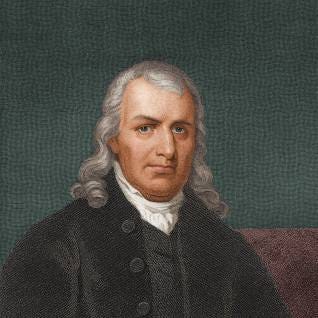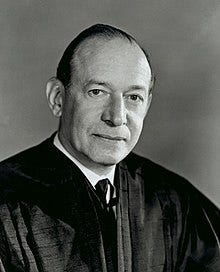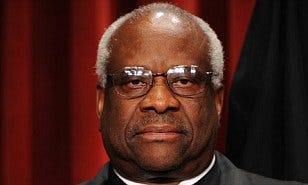SCOTUS Justices who were accused of ethical violations
Learn which justice resigned his seat and why



Issue #302 American History April 18, 2023
Over the past several weeks, instances of breaches of ethics by an Associate Justice of the Supreme Court of the United States (SCOTUS) have been reported. Each report about Clarence Thomas is more serious than the previous one. There have been calls for Thomas to resign (not gonna happen) and also calls for his impeachment (again, not gonna happen with a Republican majority in the House of Representatives).
The SCOTUS is the only branch of the government without special legal rules to hold the Justices accountable. The SCOTUS basically governs itself, and current Chief Justice John Roberts, appointed to his lifetime appointment by President George W. Bush, has refused to do anything about the reported ethics breaches by Associate Justice Thomas.
There have been two other instances where SCOTUS justices have been called to account, early in the 19th century, and later in the 20th century.
Please make sure to view and act on the important information at the end of this article to help support “We Are Speaking.” Thank you!
On November 30, 1804, for the third time, the United States Senate began preparations for an impeachment trial. In 1798 and 1799, the Senate had tried a senator previously expelled on grounds of treason. The Senate dismissed the case, citing a lack of jurisdiction. The second impeachment trial, in 1804, removed a federal judge accused of drunkenness and insanity. The third trial, however, challenged the Senate to explore the meaning of impeachable crimes.
A quick reminder, all government officials, including Supreme Court justices can be impeached by the House of Representatives. Articles of impeachment are declared by the House and then presented to the Senate for a trial. The leader of the Senate can decide whether or not to accept the Articles of Impeachment and begin the trial, which is usually presided over by the Chief Justice of the Supreme Court. After the trial, the Senate then votes to acquit the official or to remove the official from their post.
Samuel Chase was the only Supreme Court Justice to be impeached by the House of Representatives. In 1804, he was charged with political bias and abuse of power, accused of openly supporting the Federalist Party and using his position to influence the outcome of trials. Despite being acquitted by the Senate, the impeachment left a lasting mark on the judiciary and the political landscape.
In contrast, Abe Fortas resigned from his position as a Supreme Court Justice in 1969, amidst a scandal involving his financial ties to a private foundation. Fortas had accepted a large sum of money from the foundation, which critics argued amounted to a conflict of interest and compromised his impartiality on the bench. Though he initially attempted to weather the storm, the controversy eventually led to his resignation just 11 days later.
Both cases highlight the importance of judicial independence and impartiality and the potential consequences of breaching these principles. While Chase's impeachment served as a warning to future judges to avoid political entanglements, Fortas' resignation demonstrated the high standards to which Supreme Court Justices are supposed to be held.
Ultimately, these cases remind us of the vital role of the judiciary in our democracy, and the need to ensure that our judges remain above reproach.
At present, the perception of the integrity of the Supreme Court is at its lowest level in history.
Only time will tell if Associate Justice Clarence Thomas will face any real consequences for his years of breaches of ethics, and possibly of breaking the law.
You can always leave any questions in the comments or email us.
This article is free to access for 7 days after publication. Please consider becoming a paid subscriber for $5/month or less to access all of the articles and other benefits.
This is your chance to support everything Keith and Pam do. We appreciate you!
Purchase and download your copy of the “Branding And Marketing For The Rest Of Us” eBook for Independent Authors and Creative and Solo Professionals and other valuable eBooks.
Enroll in one of the 6-course bundles designed especially for you: “Author and Book Marketing” and/or “Essential Creative Marketing.”
Purchase your copies of “Detroit Stories Quarterly” issues.
What else do Keith and Pam do?
Where else can you find us?
Click the link below to learn everything you need to know and review everything we offer for independent writers and creative and solo professionals.








